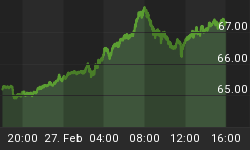It is crucial to understand what one of the key drivers of global economic growth is today. If investors can realize what is occurring, they will know that a protracted sell off in the commodity and equity markets is probably not in the cards for several more years.
Central bankers have not been deterred from their primary objective, which is to try to engender prosperity by printing money, and it is this inflation masquerading as growth that is deceiving most investors. Unfortunately, our new Federal Reserve chairman is no exception.
Ben Bernanke cooed right on cue at his April 27th testimony before congress, stating that the campaign to raise interest rates might take a pause even if rates are not yet balanced. Since this message was repeated after the FOMC's latest meeting, the markets clearly glimpsed the emergence of his pinfeathers as those of a dove, a dove that fears recession far more than inflation.
There are three salient questions that must be asked at this juncture. If the U.S. economy is as strong as most pundits' claim, why is the dollar falling precipitously? If inflation expectations are low, why are gold and virtually every commodity soaring? And why are some of the major market averages near record highs, when the economy is expected to slow and interest rates are rising?
The answer to all of these questions is that inflation is here and much more virulent than professed. The apparent strength the global economy is experiencing is being spurred by excess liquidity both domestically and worldwide. The dollar is losing its interest rate-driven support in anticipation of the fed ceasing to raise rates and it will likely continue to adjust downward against foreign currencies with a more favorable rate outlook. The fact that the mainstream media and administration representatives like to promulgate the notion that inflation is low does not deceive the commodity markets. Excessive liquidity is finding a home in real stores of value and it is this superfluous monetary creation that is sending the equity averages to such lofty levels.
I believe the economy's rate of growth is slowing while the rate of monetary creation continues to grow unabated. Moreover, if the economy heads towards recession, Ben Bernanke is likely to increase the rate of monetary creation even further and lower the cost of money simultaneously, especially since the main driver for a slowing economy may continue to be the weakening housing market. According to CNN/Money, 22% of the 8.7 trillion mortgages held by Americans will reset in 2006, which means a typical 3-year a.r.m. will go from 3.6% to 5.6%. On a 500k mortgage, the monthly payment would increase by $800, which should exacerbate an already struggling real estate market.
Given the crosscurrents of today's economy and the likelihood of further softness in housing, investors would be wise to shy away from consumer discretionary stocks and focus on high yielding foreign equities. That defensive strategy gives you a hedge against a falling dollar and the cushion of dividends. Although I am not sanguine on the U.S. stock market, I do not align myself with most perennial bears. What they tend to overlook is that elevated inflation rates tend to bolster most asset classes, which can include common stocks for longer than expected. Even though a correction in commodity, equities and especially housing markets seems quite possible in the near-term, don't look for a collapse in these markets until the dollar falls apart, a risk in today's market, but an event that might materialize a lot later in the future than many might expect.
The Dollar has a Bernanke problem. Inflation is running strong. Such concerns should govern an investor's thinking today, but keep in mind these are long running sagas, not story lines that are likely to bring about cataclysm at any moment.
**Investors are increasingly turning to Canada for energy sector exposure. To learn more, get "Go North!" our exclusive, free report on Canadian royalty trusts.















